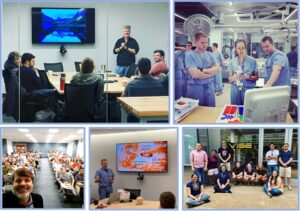Home » Supported Research » Training Program for Innovative Engineering Research in Surgery and Intervention
Training Program for Innovative Engineering Research in Surgery and Intervention
Title:
Training Program for Innovative Engineering Research in Surgery and Intervention
Project Number:
5T32EB021937-05
Contact PI/Project Lead:
Michael Miga
Award Organization:
National Institutes of Health
Abstract:
Over the past several decades, dramatic breakthroughs in biomedical science have been witnessed within laboratory research. The ability to translate those discoveries as well as to make new discoveries within human investigations has been a challenge and has been often characterized as the bottleneck of clinical research. Added to this context has been the dramatic changes to healthcare organizational environments, constraints on delivery, efficiency, and reimbursements to include major structural changes to the investment in healthcare research, both federally, and industrially. Lastly, as a result of dramatic systemic changes in healthcare funding structure, the impact on higher educational graduates’ careers, specifically doctoral graduates, has been quite profound. Within that changing dynamic landscape, we hypothesize that the fundamental bottlenecks associated with clinical translational research can be dramatically loosened with the training of engineers intimately familiar with human treatment and trained in the inception of novel technology-based platforms. We further hypothesize that continued scientific discoveries within the human environment as well as novel treatment approaches are highly dependent on these technology-based instrumentation platforms. The purpose of this training program is to create a new cadre of researchers capable of creating, developing, implementing, clinically evaluating, and translating methods, devices, algorithms, and systems designed with a clear focus at one particular application of medicine, namely, to facilitate surgical/interventional processes and their outcomes. Thematically, our trainees and training program will have a central focus – innovative platform technologies for treatment and discovery. While this training program addresses pressing problems in biomedical research, namely the translation and facilitation of human investigative systems, the program also speaks to improving higher education career trajectories by providing a novel professional development atmosphere. Briefly described, the training program is a year 2, 3 program with an initial year 1 requiring participation in a novel professional development and a broad therapeutic bioengineering course. With application and acceptance to trainee status, trainees experience an immersion in the clinical environment involving literature reviews, needs assessments, and novel proposals to clinical barriers towards treatment and discovery. Continued course work in areas associated with image-guided procedures, interventional imaging, interventional medical image processing and analysis, robotics and medical device design, modeling & simulation, and interventional therapeutics will provide trainees with almost limitless options for the creation of novel technologies. This all takes place within an environment that is highly promoting of technology transfer as well as scientific discovery. We believe Vanderbilt to be one of the most unique environments that includes incredible close proximity of surgical and interventional suites, robotic and medical device fabrication capabilities, guidance and analysis laboratories, extensive therapeutic investigations, imaging infrastructure, large animal surgical facilities, and a clinical cadre with a history of pioneering invention with our engineers. This is a Training Program for Innovative Engineering Research in Surgery and Intervention.
